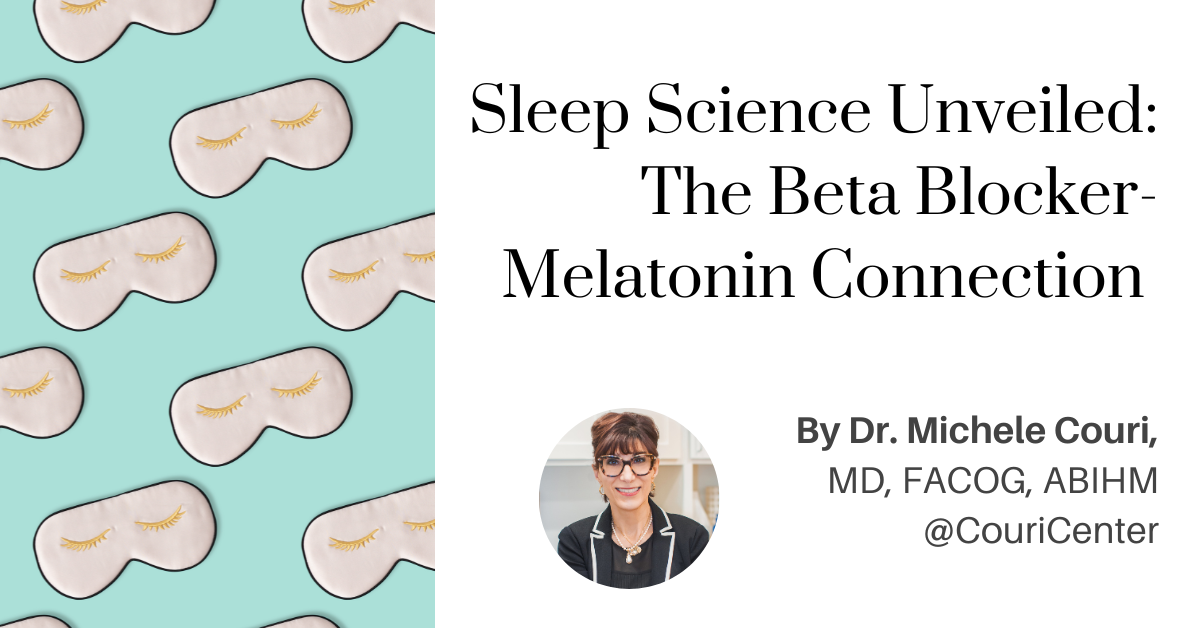
Summary
In Dr. Couri's latest blog, she delves into the intricate relationship between beta blockers and melatonin production, shedding light on how commonly prescribed medications can disrupt sleep patterns. Drawing from recent scientific studies, Dr. Couri reveals startling findings on the impact of beta blockers on sleep quality, advocating for melatonin supplementation as a promising solution. With millions suffering from sleep disorders, her insights offer valuable guidance for patients seeking to optimize their sleep health and overall well-being.
As a gynecologist, I often hear patients describe their struggles with insomnia or difficulty sleeping, especially among my menopausal patients. According to the National Sleep Foundation, it is estimated that around 30% of adults experience short-term insomnia, while approximately 10% have chronic insomnia. There are many possible causes of insomnia, and finding the correct treatment can be challenging.
Recently, I attended an amazing conference on nutrition and lifestyle medicine and learned that beta blockers, one of the most commonly prescribed medications worldwide, can deplete our production of melatonin, a hormone that regulates sleep-wake cycles. Beta blockers are frequently prescribed for high blood pressure and other heart-related conditions, and some of the most common beta blockers include atenolol, metoprolol, propranolol, bisoprolol, and carvedilol. Upon hearing about this association between beta blockers and decreased melatonin production, I decided to do a deeper dive into the scientific literature to confirm.
A Russian study from 2021 studied 114 patients ages 47-83 who were on beta blockers and compared them to 110 patients similar in age and sex who did not receive beta blockers. They found that long-term beta blocker administration decreased endogenous melatonin production by 50%, and in these patients taking the beta blockers, there was a significant increase in sleep latency (the time it takes for a person to fall asleep after lying down in bed and attempting to sleep) and decreased REM sleep (REM sleep is characterized by rapid movement of the eyes, vivid dreaming, and heightened brain activity).
A second study from 2012 in the journal Sleep showed that 3 weeks of supplementation with 2.5 mg of nightly melatonin in patients on beta blockers significantly improved sleep quality, without apparent tolerance and without rebound sleep disturbance during withdrawal of melatonin supplementation. This was a small study of only 16 patients ages 45-64, but the results were statistically significant.
The National Sleep Foundation reports that around 50-70 million adults in the U.S. have a sleep disorder, and insufficient sleep is considered a public health problem. Considering that in 2021, over 108 million prescriptions were written for beta blockers, it is not surprising to me the sheer number of patients who suffer from insomnia in this country. Melatonin supplementation, when used appropriately and in conjunction with the advice of your health care provider, can improve sleep quality, especially in patients on beta blockers. At the Couri Center for Gynecology and Integrative Women’s Health, we carry reputable brands of melatonin, and a few of our favorite melatonin supplements are Xymogen’s Melatonin CR® and Xymogen’s Melatonin® in addition to Bioclinic Naturals Somno-Pro®. For your convenience, you may purchase online or in-store 8:00 AM – 4:30 PM, M-F.
To Your Health,
Dr. Couri
DISCLAIMER: THE INFORMATION PROVIDED ON THIS WEBSITE IS INTENDED FOR GENERAL INFORMATIONAL PURPOSES ONLY AND IS NOT INTENDED TO BE A SUBSTITUTE FOR PROFESSIONAL MEDICAL ADVICE, DIAGNOSIS, OR TREATMENT. THE INFORMATION PROVIDED IS CURRENT AS OF THE DATE OF PUBLICATION OR LAST REVIEW, BUT MEDICAL KNOWLEDGE IS CONSTANTLY EVOLVING, AND THE INFORMATION MAY BECOME OUTDATED OVER TIME.
References Used:
Tikhomirova, OV, et al. Zh Nevrol Psikhiatr IM S S Korsakova. 2021;121(8):7-12.
Scheer, et al. Sleep. 2012; Oct 1;35(10):1395-1402.
ClinCalc DrugStats Database
